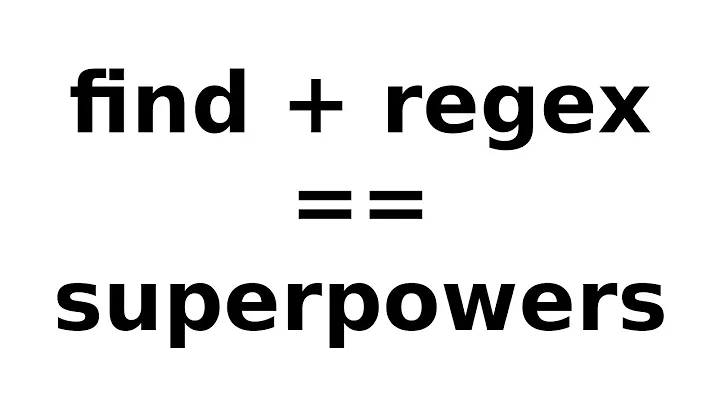can regex capture groups be used in GNU find command?
Solution 1
An alternative to l0b0's fine answer (shorter, but potentially slightly less efficient):
Assuming a (recent) GNU sed:
find pool -print0 |
sed -znE 's|.*/mypackage-([[:alnum:].]+-[0-9]{1,2})-x86_64\.pkg\.tar\.xz$|\1|p'|
tr '\0' '\n'
Note the expensive part of find is the walking down the tree which it will have to do anyway whether you have -regex or not. So here, we're doing the matching and reporting in sed instead.
Solution 2
If you use
find pool -regextype posix-extended \
-regex ".*/mypackage-([a-zA-Z0-9.]+-[0-9]{1,2})-x86_64\.pkg\.tar\.xz" \
-printf '%f\n' |
grep -Eo '[a-zA-Z0-9.]+-[0-9]{1,2}'
(assuming GNU grep as well), it should work for any path. The regex doesn't allow for any newlines, so there's no way to make it match for example a directory containing a similar name.
Related videos on Youtube
starfry
Updated on September 18, 2022Comments
-
starfry almost 2 years
With the GNU
findcommand (GNU findutils 4.4.2), a regular expression can be used to search for files. For example:$ find pool -regextype posix-extended -regex ".*/mypackage-([a-zA-Z0-9.]+-[0-9]{1,2})-x86_64.pkg.tar.xz+"Is it possible to extract the capture group defined by that expression and use it in a
-printfargument?So, given a found file called
pool/mypackage-1.4.9-1-x86_64.pkg.tar.xz, I would like to include the1.4.9-1part in aprintfexpression.Is this possible?
-
 Stéphane Chazelas about 10 yearsNo, but you can use
Stéphane Chazelas about 10 yearsNo, but you can use-print0and pipe to GNUsed -Ez(possibly followed bytr '\0' '\n') -
 Stéphane Chazelas about 10 yearsNote that
Stéphane Chazelas about 10 yearsNote that[a-zA-Z]only makes sense in the C/POSIX locale. -
starfry about 10 yearsI expected the simple answer to be No given copious amounts of searching and reading man pages before asking the question. The answers provide interesting alternaive ways to achieve the desired output.
-
-
l0b0 about 10 yearsYep, just thought it was nice to reuse the regex exactly




